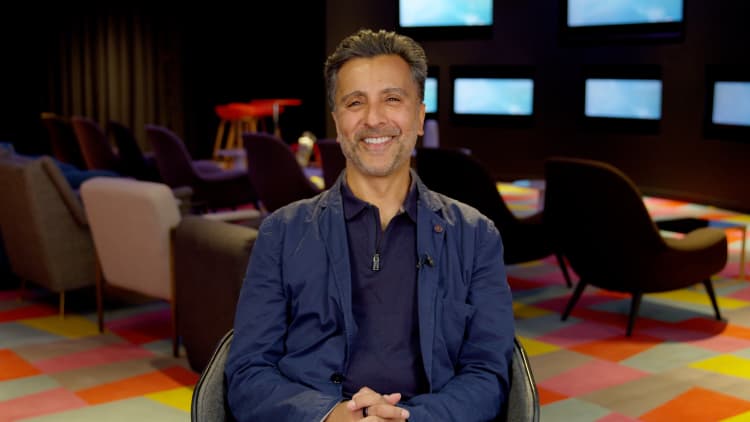You might think mental toughness means never making mistakes.
It's actually the opposite. Mental toughness is more about your ability to recover from missteps. When implemented properly, the relentless determination to push through your obstacles can help you learn from your mistakes and move on from them.
But obsessing over mental toughness can backfire, experts say: Instead of putting your mistakes in the rearview mirror, you might start fixating on them, internally berating yourself in an attempt at self-motivation.
The best analogy is an athlete mired in a slump, says Ethan Kross, an organizational psychologist and author of the 2021 book "Chatter: The Voice in Our Head, Why it Matters, and How to Harness It."
"Once you start thinking, 'Am I swinging a baseball bat fast enough? Am I gripping it too tight?'… the whole thing unravels, and it leads to choking and poor performance," Kross tells CNBC Make It.
If mess up a couple of tasks at work, you might start telling yourself you don't have what it takes to earn a promotion. That negative self-talk leads to self-doubt, which can distract you from doing your next few tasks correctly.
Balancing your mental toughness with self-compassion — or, convincing yourself that you're capable of improving — can help. In July, a systemic review in the academic journal Frontiers in Psychology found links between self-compassion and mental toughness, noting that people who show signs of both are more likely to bounce back after mistakes, losses and in the case of athletes, injuries.
Here's how to identify and take control of that voice inside your head, and how harnessing it properly might improve your confidence and productivity.
Assess your needs
Negative self-talk comes from a desire to motivate yourself, says Céline Kosirnik, a sports psychologist and visiting doctorate student at Columbia University who co-authored the Frontiers in Psychology study.
She says she asks struggling athletes two questions: Do you feel you're underperforming because you're lazy? Or are you tired, stressed or preoccupied about something else and need assurance?
Understanding yourself and your needs isn't a sign of softness, Kosirnik says. It's a sign of self-reliance.
"When you're learning how to ride a bicycle, your parents are behind you says, 'Good job, keep going,'" she says. "As you get older, not a lot of people do this for you. We often wait for others to tell us when we've done well. And this is good, we need others — but you also need to know how to do it with yourself and be your own friend and your own coach."
If 'chatter' persists, complete mundane tasks
Kross defines "perseverating, negative worrying" as "chatter" that can easily distract you from reality. It makes you unproductive, and sometimes, you don't even realize you're experiencing it, he says.
"[Chatter] can make it really hard for us to focus our attention," Kross says. "If you've ever had the experience of trying to read a few pages of the book... without remembering anything that's being read, that's a sign you're worrying or ruminating about something."
To refocus, he recommends doing small, mundane tasks like making your bed, doing the dishes or organizing your space to regain control of your thoughts.
Talk to yourself in the third person like a 'tough coach'
But it's impossible to eliminate your inner voice, nor should you want to: It helps you motivate yourself and learn from your mistakes, Kross says.
But if you notice your inner dialogue is riddled with doubt, show yourself some tough love — even referring to yourself by name to create distance, if necessary, he recommends.
"Encouraging oneself like a tough coach is useful, too," Kross says. "It's not like [saying] 'Everything's going to be fine, you're great, you're unique.' It can be, 'Get your act together, Ethan. You're not going to fail.'"
Think of obstacles as challenges
Whenever you're in a stressful situation, ask yourself two questions, Kross recommends: What's required of me, and do I have the skills and resources to match it?
If you tell yourself it's going to be too hard, you're likely right, he says. Instead, try to figure out if you can use any of your strengths to get closer to a solution.
"Thinking about your circumstances like a challenge can be a helpful antidote," he says. "If you think to yourself, 'Yeah, I can do this,' you'll have a better performance, a better physiological response."
Combat self-doubt with self-compassion
The best antidote to self-doubt is self-compassion, according to Kosirnik's research. But getting high-performing people on board with a kinder mentality can be difficult, and the idea of compassion alone makes some people wary, she says.
Self-compassion doesn't equate to unfaltering positivity, Kosirnik says she tells her clients. Rather, it can help you identify whether you need motivation or reassurance.
"People see self-compassion like a world of unicorns," she says. "They say, 'You're too kind with yourself, you're not going to make it.' But that's what they get wrong. You need to have the right judgement in specific situations to figure out what you need."
Leave some room for constructive self-criticism
Not all negative self-talk is bad, Kross says. It can help you learn from mistakes, as long you're not dwelling on them and it doesn't impact your self-esteem.
"The ability to be critical in small doses — like when I screw something up — is actually useful for me to able to recognize the screw up," he says. "Emotions serve a powerful, useful function in our lives. We evolved to have emotions for a reason."
Sign up now: Get smarter about your money and career with our weekly newsletter
Don't miss:
This ‘very easy’ mindset shift is proven to boost mental toughness and resilience, psychologists say



